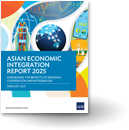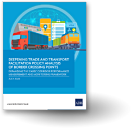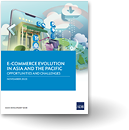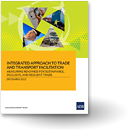
Official Launch of the Asian Economic Integration Report 2019/2020
Demographic Change, Productivity, and the Role of Technology
ADB will launch the AEIR 2019/2020 on 13 November 2019 at the Research Institute of Economy, Trade and Industry (RIETI), and National Graduate Institute for Policy Studies (GRIPS) in Tokyo, Japan. The GRIPS event will be streamed live via ADB's Japan Representative Office Facebook account at 3:30 pm (Manila), 4:30 pm (Tokyo).
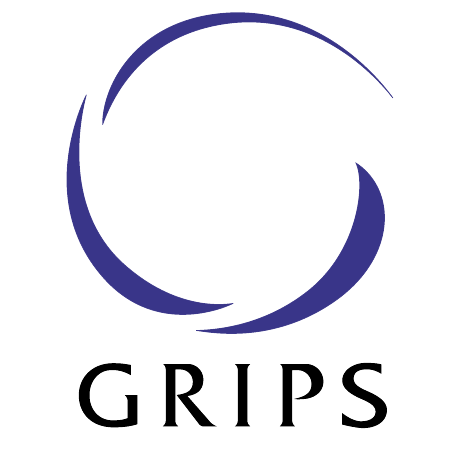
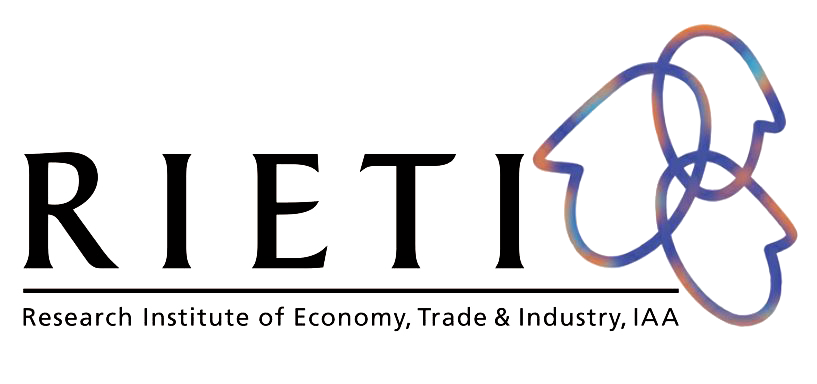
Event details
Date/Venue:
- 13 November 2019
Tokyo, Japan
- 12:15–1:30 P.M.
Research Institute of Economy, Trade and Industry (RIETI),
11th floor, Annex, Ministry of Economy, Trade and Industry (METI),
1-3-1, Kasumigaseki Chiyoda-ku,
Tokyo 100-8901 - 4:30–5:45 P.M.
National Graduate Institute for Policy Studies (GRIPS),
Lecture Room L, 5th Floor,
7-22-1 Roppongi, Minato-ku,
Tokyo 106-8677 Download:
-
Agenda (RIETI)
Agenda (GRIPS) Links:
-
The Official AEIR page
The AEIR Data Catalogue page
ADB AEIR page
ADB AEIR News Release
ADB AEIR Theme Chapter Video

Research Institute of Economy, Trade and Industry (RIETI)
12:00 n.n–12:15 p.m. - RegistrationModerator:Hideaki Fujisawa Director,
Asia and Pacific Division, Trade Policy Bureau, Ministry of Economy, Trade and Industry12:15–12:20 p.m. Introduction12:20–12:50 p.m. Presentation on the Key Findings of Asian Economic Integration Report 2019/2020Yasuyuki Sawada Chief Economist and Director General,
ADBAiko Kikkawa Takenaka Economist,
ADB12:50–1:20 p.m. Panel DiscussionDemographic Change, Productivity, and the Role of TechnologyPanelists:Izumi Ohno Director,
JICA Research InstituteDaiji Kawaguchi Professor,
University of TokyoYasuyuki Sawada Chief Economist and Director General,
ADBAiko Kikkawa Takenaka Economist,
ADB1:20–1:30 p.m. Open Floor Discussion1:30p.m. Closing
National Graduate Institute for Policy Studies (GRIPS)
4:15–4:30 p.m. - Registration
4:30–4:35 p.m. - Opening RemarksHideaki Fujisawa Professor,
GRIPS4:35–5:00 p.m. Presentation on the Key Findings of Asian Economic Integration Report 2019/2020 Yasuyuki Sawada Chief Economist and Director General,
Yasuyuki Sawada Chief Economist and Director General,
ADBBioYASUYUKI SAWADA is the chief economist of ADB and director general of the Economic Research and Regional Cooperation Department (ERCD). As ADB’s chief spokesperson on economic and development trends, he leads the production and dissemination of the bank’s flagship knowledge products as well as the provision of support for various regional cooperation forums such as the Association of Southeast Asian Nations Plus Three (ASEAN+3) and the Asia–Pacific Economic Cooperation (APEC) forum. Before joining ADB, Sawada was a professor of economics at the University of Tokyo. He carried out research in a variety of institutions, such as the Japan International Cooperation Agency Research Institute and the World Bank, where he led a number of large-scale development policy evaluation projects in Asia and developing countries elsewhere. His key research areas are macro- and microdevelopment economics, microeconometrics, economics of disasters, and field surveys and experiments. Sawada obtained his doctor of philosophy (PhD) degree in economics and master’s degree in international development policy from Stanford University.
5:00–5:40 p.m. Panel DiscussionRegional Cooperation and Integration in Asia and the PacificChair:Harumi Kodama Representative,
Japanese Representative Office, ADBPanelists: Jong Woo Kang Principal Economist,
Jong Woo Kang Principal Economist,
ADBBioJONG WOO KANG is the principal economist of the Regional Cooperation and Integration Division in ERCD at ADB. He was senior advisor to the managing director general of ADB and senior economist in the Strategy and Policy Department at ADB. He has published articles in economic journals on topics including regional integration, inclusive growth, macroeconomic and international trade policies, and aid effectiveness. Before joining ADB, he was director at the Ministry of Finance and Economy of the Republic of Korea until 2006. He gained his bachelor of arts degree in economics and master of arts degree in public administration from Seoul National University, and his PhD in economics from the University of Washington.
 Kenichi Kawasaki Professor,
Kenichi Kawasaki Professor,
GRIPSBioKENICHI KAWASAKI is currently a professor at GRIPS Alliance, at the National Graduate Institute for Policy Studies in Japan. He has been a consulting fellow of the Research Institute of Economy, Trade and Industry; an adjunct fellow of the Japan Institute of International Affairs; a visiting researcher of the Institute of Energy Economics, Japan; and a research fellow of the Economic Research Institute for ASEAN and East Asia (ERIA). Kawasaki also joined the Economic Planning Agency (current Cabinet Office) and spent more than 2 decades with the Government of Japan including on secondment to the Organisation for Economic Co-operation and Development. He has contributed to many policy studies, working on APEC research projects on the impacts of trade and investment liberalization and facilitation, for example. He took part in joint studies of the Government of Japan and trading partners on Japan’s Economic Partnership Agreements (EPAs) and on the economic impacts of EPAs including the TransPacific Partnership Agreement. Kawasaki holds a PhD in economics from Osaka University and a bachelor of science degree in mathematics from the University of Tokyo.
 Sayuri Shirai Professor,
Sayuri Shirai Professor,
Keio UniversityBioSAYURI SHIRAI is currently a professor of Keio University and a visiting scholar at the Asian Development Bank Institute (ADBI). She holds a PhD in economics from Columbia University. She was a member of the Policy Board of the Bank of Japan in 2011–2016. She also taught at Sciences Po in Paris in 2007–2008 and was an economist at the International Monetary Fund (IMF) in 1993–1998. She is the author of numerous books and papers on a variety of subjects including monetary policies; global financial centers and financial market developments; macroeconomies in Japan, Europe, and the United States; exchange rate systems; IMF policy; central bank digital currency; and cryptocurrency issues. Her most recent book in English titled Mission Incomplete: Relating Japan’s Economy was published by ADBI in 2017, with a second edition released in 2018 (free download available). Her most recent book in Japanese titled Textbook of Money in the Cryptocurrency Era was published in April 2019.
 Shujiro Urata Professor,
Shujiro Urata Professor,
Waseda UniversityBioSHUJIRO URATA is a professor of economics at the Graduate School of Asia–Pacific Studies, Waseda University; faculty fellow at the Research Institute of Economy, Trade and Industry; specially appointed fellow at the Japan Center for Economic Research; senior research advisor at ERIA; and visiting researcher at ADBI. He was a former research associate at the Brookings Institution and an economist at the World Bank. Specializing in international economics, he has published a number of books and articles on international economic issues. His coauthored books include Measuring the Costs of Protection in Japan, which was published by the Institute for International Economics. His recent coedited books include Emerging Global Trade Governance: Mega Free Trade Agreements and Implications for ASEAN (Routledge, 2018) and East Asian Integration: Goods, Services and Investment (Routledge, 2019). Urata received his bachelor of arts degree in economics from Keio University, and master of arts and PhD degrees in economics from Stanford University.
5:40–5:55 p.m. Open Floor Discussion5:55–6:00 p.m. Concluding Remarks Yasuyuki Sawada Chief Economist and Director General,
Yasuyuki Sawada Chief Economist and Director General,
ADBBioYASUYUKI SAWADA is the chief economist of ADB and director general of the Economic Research and Regional Cooperation Department (ERCD). As ADB’s chief spokesperson on economic and development trends, he leads the production and dissemination of the bank’s flagship knowledge products as well as the provision of support for various regional cooperation forums such as the Association of Southeast Asian Nations Plus Three (ASEAN+3) and the Asia–Pacific Economic Cooperation (APEC) forum. Before joining ADB, Sawada was a professor of economics at the University of Tokyo. He carried out research in a variety of institutions, such as the Japan International Cooperation Agency Research Institute and the World Bank, where he led a number of large-scale development policy evaluation projects in Asia and developing countries elsewhere. His key research areas are macro- and microdevelopment economics, microeconometrics, economics of disasters, and field surveys and experiments. Sawada obtained his doctor of philosophy (PhD) degree in economics and master’s degree in international development policy from Stanford University.
